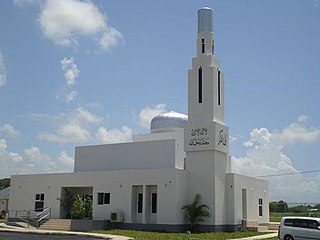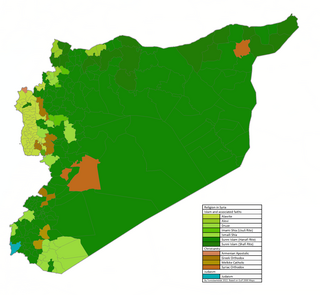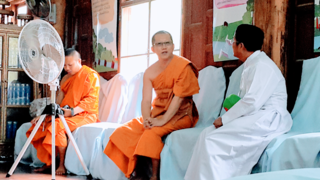
The terms Muslim world and Islamic world commonly refer to the Islamic community, which is also known as the Ummah. This consists of all those who adhere to the religious beliefs, politics, and laws of Islam or to societies in which Islam is practiced. In a modern geopolitical sense, these terms refer to countries in which Islam is widespread, although there are no agreed criteria for inclusion. The term Muslim-majority countries is an alternative often used for the latter sense.

Islam is a minority faith in Thailand, with statistics in 2006, suggesting 4.9% of the population are Muslim. Figures as high as 5% of Thailand's population have also been mentioned. A 2023 Pew Research Center survey gave 7%. Thai Muslims are the largest religious minority in the country. As of 2024, there are approximately 7.5 million Thai Muslims in the Kingdom or about 12% of the total 62.5 million Thai populations..

Islam constitutes the third largest religion in Singapore, with Muslims accounting for approximately 15.6% of the population, as indicated by the 2020 census. Predominantly, Singaporean Muslims are Sunni Muslims adhering to either the Shafi‘i or Hanafi schools of thought. The majority of the Muslim population, about 80%, are ethnic Malays, while 13% are of Indian descent. The remaining fraction comprises local Chinese, Eurasian, and Arab communities, in addition to foreign migrants. Buddhism and Christianity are the two larger religious affiliations in the country.

Islam is the third largest religion in Sri Lanka, with about 9.7 percent of the total population following the religion. About 1.9 million Sri Lankans adhere to Islam as per the Sri Lanka census of 2012. The majority of Muslims in Sri Lanka are concentrated in the Eastern Province of the island. Other areas containing significant Muslim minorities include the Western, Northwestern, North Central, Central and Sabaragamuwa provinces. Muslims form a large segment of the urban population of Sri Lanka and are mostly concentrated in major cities and large towns in Sri Lanka, like Colombo. Most Sri Lankan Muslims primarily speak Tamil, though it is not uncommon for Sri Lankan Muslims to be fluent in Sinhalese. The Sri Lankan Malays speak the Sri Lankan Malay creole language in addition to Sinhalese and Tamil.

In 2007, there were over 5,000 Muslims residing in Puerto Rico, representing about 0.1% of the population. The early Muslim community largely consisted mainly of Palestinian and Jordanian immigrants who arrived between 1958 and 1962. At the time, the vast majority of Puerto Rico's Muslims lived in Caguas – a city in the island's central region located south of San Juan – where they operated restaurants, jewelry stores and clothing outlets. A storefront mosque on Calle Padre Colón in the Río Piedras district of San Juan served the entire religious community on the island during earlier years, however, today there are mosques and Islamic centers in Aguadilla, Arecibo, Hatillo, Ponce, Vega Alta, and San Juan. The American Muslim Association of North America (AMANA) also has an office in Cayey.

Jamaica is a predominantly Christian country, with Islam being a minority religion. Due to the secular nature of Jamaica's constitution, Muslims are free to proselytize and build places of worship in the country.

Chile is a predominantly Christian country, with adherents of Islam being a minuscule minority. Due to the secular nature of Chile's constitution, Muslims are free to proselytize and build places of worship in the country. The statistics for Islam in Chile estimate a total Muslim population of approximately 5,000, representing less than 0.02% of the population. There are a number of Islamic organizations in Chile, including the Muslim Society of Chile and As-Salam Mosque in Santiago, Bilal Mosque in Iquique, the Mohammed VI Cultural Center in Coquimbo, and Islamic Foundation of Chile in Santiago.

Islam is the second largest religion in Norway after Christianity. As of 2020, the number of Muslims living in Norway was 182,607. The majority of Muslims in Norway are Sunni, with a significant Shia minority. 55 percent of Muslims in the country live in Oslo and Viken. The vast majority of Muslims have an immigrant background, and very few Norwegians are Muslim.

Islam in Madagascar is a minority religion, with most Malagasy people adhering to Christianity. Due to secular nature of the Madagascar's constitution, Muslims are free to proselytize and build places of worship in the country.
For approximately a millennium, the Abrahamic religions have been predominant throughout all of the Middle East. The Abrahamic tradition itself and the three best-known Abrahamic religions originate from the Middle East: Judaism and Christianity emerged in the Levant in the 6th century BCE and the 1st century CE, respectively, while Islam emerged in Arabia in the 7th century CE.
The Turkmen of Turkmenistan, are predominantly Muslims. According the U.S. Department of State's International Religious Freedom Report for 2022,
According to U.S. government estimates, the country is 93 percent Muslim, 6.4 percent Eastern Orthodox, and 0.6 percent other. There are small communities of Jehovah's Witnesses, Shia Muslims, Baha’is, Roman Catholics, the International Society for Krishna Consciousness, and evangelical Christians, including Baptists and Pentecostals. Most ethnic Russians and Armenians identify as Orthodox Christian and generally are members of the Russian Orthodox Church or Armenian Apostolic Church. Some ethnic Russians and Armenians are also members of smaller Protestant groups. There are small pockets of Shia Muslims, consisting largely of ethnic Iranians, Azeris, and Kurds, some located in Ashgabat, with others along the border with Iran and in the western city of Turkmenbashy.

Religion in Syria refers to the range of religions practiced by the citizens of Syria. Historically, the region has been a mosaic of diverse faiths with a range of different sects within each of these religious communities.
The Constitution of Bangladesh includes secularism as one of the four fundamental principles, despite having Islam as the state religion by 2A. Islam is referred to twice in the introduction and Part I of the constitution and the document begins with the Islamic phrase Basmala which in English is translated as “In the name of Allah, the Beneficent, the Merciful” and article (2A) declares that :"Islam is the state religion of the republic". Bangladesh is mostly governed by secular laws, set up during the times when the region was ruled by the British Crown.

According to the 2018 census, Buddhism is the largest religion in Thailand, practiced by over 94% of the population; Islam makes up 5% of the population. The Thai government officially recognizes five religions: Buddhism, Islam, Hinduism, Sikhism, and Christianity.
The Constitution of Bahrain states that Islam is the official religion and that Shari'a is a principal source for legislation. Article 22 of the Constitution provides for freedom of conscience, the inviolability of worship, and the freedom to perform religious rites and hold religious parades and meetings, in accordance with the customs observed in the country; however, the Government has placed some limitations on the exercise of this right.

Christianity is the largest religion in Botswana. However, the country is officially secular and allows freedom of religious practice.

Education in Dominica is compulsory from ages 5 to 16. The gross primary enrollment rate was 100.4 percent in 1991 and 98.2 percent in 1998, and the net primary enrollment rate was 88.7 percent in 1991 and 88.8 percent in 1998. Primary school attendance rates were unavailable for Dominica as of 2001. Poor physical conditions in many primary schools affect the quality of education, while some schools are overcrowded, limiting access to primary education, particularly for children living in urban areas around the capital. Poverty and work on family banana farms during the harvest season can affect school attendance, but other employment does not pull minors out of school. There is a significant Carib Indian population in Dominica, and schools on the Carib Territory are reported to have fewer resources.

The most common religion in Dominica is Christianity, with a majority of practitioners identifying as Catholic. Various minority religious groups are also present on the island.
Freedom of religion in Morocco refers to the extent to which people in Morocco are freely able to practice their religious beliefs, taking into account both government policies and societal attitudes toward religious groups. The constitution declares that Islam is the religion of the state, with the state guaranteeing freedom of thought, expression, and assembly. The state religion of Morocco is Islam. The government plays an active role in determining and policing religious practice for Muslims, and disrespecting Islam in public can carry punishments in the forms of fines and imprisonment.
The Al Ansaar Mosque is a mosque in Portsmouth, Saint John Parish, Dominica.












